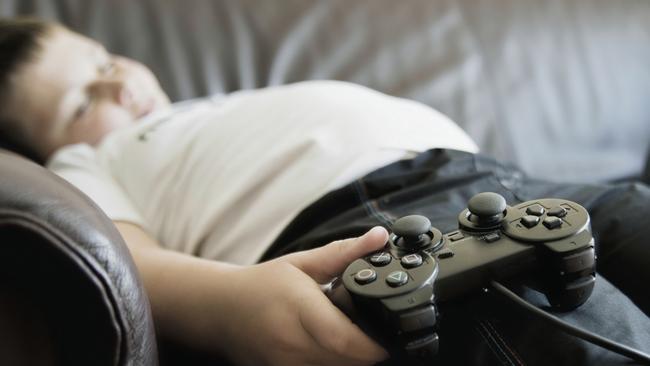Zombie-like kids barely move for 11 hours a day, reveals landmark health check
A landmark study into the health of preteens show that Aussie kids spend an astonishing amount of their day sitting still – the number of hours is so high that researchers thought many of them had fallen asleep.
QLD News
Don't miss out on the headlines from QLD News. Followed categories will be added to My News.
AUSTRALIAN kids have become zombie-like with a new landmark study showing there are only three hours in a day when 11 and 12 year olds are not sitting or sleeping.
Shock findings from the Murdoch Children’s Research Institute show on average kids spend an astonishing 11 hours of the day sitting still — so still that during the study researchers thought many of them had fallen asleep.
Parents on the other hand sit for a total of nine hours per day but move around very regularly. The mums and dads are getting their recommended amount of moderate and vigorous physical activity each day while children hit only 32 minutes of the recommended 60 minutes.
Modern Qld children lagging in sporting ability
Nine-year-olds losing the enjoyment of exercise, study finds
Teaching young kids mindfulness skills can improve test results and boost wellbeing: experts
Children’s lives on the line as health crisis deepens in the bush
Fears grow for drought-affected kids as UNICEF report reveals mental health impact
The monitoring of exercise and sedentary behaviour was just one of the many tests carried out for the Institute’s Child Health CheckPoint, which assessed the health of 1800 biological parent and pre-teen pairs.
The extensive findings released today (FRIDAY) in the British Medical Journal Open also reveal that while most of the 11 and 12 year olds are healthy, there is plenty of room for improvement in physical activity, sleep, snacking, weight and early signs of chronic kidney disease.
The exercise assessment was done in conjunction with the University of South Australia.
The Australian Government’s Physical Activity and Sedentary Behaviour Guidelines says children in the 11 and 12 age group should sit at a screen no longer than two hours per day.
“Hours spent watching TV use may be a marker of general household dysfunction, poor routines and less emphasis on health. The more hours of TV the worse outcomes across the board from blood pressure to academics and quality of life,” Professor Timothy Olds of University of South Australia’s Alliance for Research in Exercise, Nutrition and Activity (ARENA) said.

In the study, the children and parents wore a wrist accelerometer for eight days.
Queensland play expert Hyahno Moser says the research figures should put parents and policy makers on high alert.
“This generation could be the first to be less healthy than the last,” Mr Moser from Nature Play Queensland said.
“We know that role modelling is a powerful tool for passing on knowledge, skills and values to our kids but we’ve created a childhood that for the most part looks very different from the one we experienced ourselves,” he said.
The new research, which is part of the longitudinal child study, Growing Up in Australia,
shows that while active parents tend to have more active kids, the link between parent and child activity levels is not particularly strong.
But the health checks showed that a parent’s lung, heart and bone health all have an impact on their child by the age of 11 or 12.
“This is likely to reflect both shared genes and similar lifestyle factors such as diet and exercise in families,” Murdoch Children’s Research Institute group leader and author on the vascular health paper Prof David Burgner said.

The assessment showed that children do not necessarily inherit their parent’s weight problems.
“Parents are, to some extent, nutritional gatekeepers for their children, but on the other hand, children spend a lot of time at school and with friends and in other environments not shared with their parents.” Dr Susan Clifford.
Queensland mum of two Tricia Gordon says she has “fresh air at five” time for her 11 year old Wylie and sets an alarm to keep limit his time on a screen to one hour at a time.
“Left to his own devices Wylie would spend a lot more time on an ipad but I make sure he is involved in a lot of organised sport and things like skateboard camp,” Ms Gordon said.
CHILD HEALTH CHECKPOINT FINDINGS
■ First study to find small intergenerational link for health-related quality of life
■ Sleep quality poor in parents and kids but adequate in duration
■ Children had much better hearing than parents but similar levels of speech reception
■ Children not bound to inherit their parents’ body shape or weight
■ Moderate association between children and parents’ vascular function
■ Almost one in 10 parents had high blood pressure
■ Parents should be taught to influence children to snack less and eat better
■ Children’s bone size and shape inherited more than density and strength
■ Modest correlations between parent and child lung capacity
■ Artery health had weak to moderate association between child and parent
■ Clear difference in health predictors in blood in children and adults


